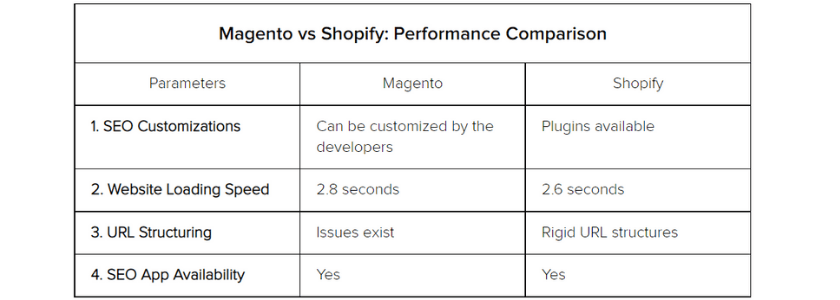Magento vs Shopify: Which is the Best E-Commerce Platform?
Online commerce has become an indispensable component of modern life. It gives you the freedom to shop from anywhere around the world, with a wide range of options to pick from, the ability to compare products and costs, and so on.
The popularity of online purchasing is skyrocketing. By 2020, more than 2 billion people will have shopped online, with global e-commerce sales exceeding 26.7 trillion dollars in 2021 post- covid. Furthermore, the global epidemic boosted demand for online commerce, with lockdown enforcing itself around the globe.
As a result, if you're a large corporation, a small business, or even a startup selling e-commerce products, you'll need e-commerce development to have a solid platform to offer your goods and services to the customers.
The e-Commerce platform chosen aids in the establishment of a solid foundation, which in turn provides the basis for a successful business.
The question comes to your mind is, Magento vs Shopify- Which is the best e-commerce platform?
E-commerce enterprises use Magento and Shopify. It's no surprise that deciding which one to use for your online store is difficult. These are two of the most well-known e-commerce platforms available today.
Shopify has a stronghold on the "hosted, all-in-one" platform industry, while Magento is the market leader., When it comes to larger, more complex e-commerce sites. Although they are completely different systems, we'd like to compare Magento and Shopify to find which is best for your business.
We've put together a comprehensive comparative review to assist you to decide if you need Shopify vs Magento. It compares the two e-commerce platforms' functionality, affordability, and usability: choose wisely and earn more.

Magento vs Shopify: What are they?
Before we go into the Magento vs. Shopify comparison, it's critical to understand these two platforms separately. It will provide a solid foundation for us to compare them and their characteristics.
What is Shopify?
Shopify is a web-based e-commerce platform. You pay monthly or annually and make use of Shopify's services. Shopify is a good choice for both small and large organizations.
What is Magento?
Magento is an open-source e-commerce platform that provides businesses with a comprehensive online shopping system, product listings, and site customization capabilities. Magento also has powerful marketing, catalog management, and discounting features. It is available in two editions -
- Magento Community Edition is a free version of Magento.
- Magento Enterprise Edition is a commercial version of Magento.
Magento vs Shopify: Head on Comparision
It's never been easy to pick the right platform to establish an online business, especially for e-Commerce newbies. The most often asked questions appear to be around open-source vs. hosted carts.
Thousands of e-commerce businesses must compare Shopify vs Magento because they are both best-in-class e-commerce platforms. Despite a few faults, both e-commerce platforms earn credit for delivering excellent features for an internet business with a lot of them.
1. Magento vs Shopify: Hosting
Shopify is a hosted solution, which means the firm handles all of your hosting concerns. The CMS and its features, as well as the hosting, are both paid for every month. Fastly operates a CDN hosting service for Shopify. To put it another way, this is a worldwide network of servers.
Magento is self-hosted, which means you must manage your hosting solution. There is an advantage to the scene because you have the option of choosing something more powerful or less expensive.
2. Magento vs Shopify: Coding
Magento and Shopify are considerably different when it comes to code and the degree of knowledge required.
Magento makes use of PHP, whereas Shopify makes use of Liquid. Magento is an open-source platform, whereas Shopify is a closed-source platform. When making a decision, it's crucial to understand the coding language used because it determines what can be done.
The term "open source" refers to software that is freely available and may be modified by anybody, whereas Shopify is proprietary. The template code in Magento can be changed to meet the needs of a single store. This is not possible with Shopify.
3. Magento vs Shopify: Pricing
It's also vital to consider how much you can afford to pay to develop your website while choosing the ideal platform for you.
Magento does not require a monthly membership. It is entirely free to download, install, and set up your store on this platform. However, you will need to pay for a name and hosting to publish your website. The price of this service varies based on your preferences.
Unlike Magento, Shopify charges a monthly subscription fee. Each month, you can choose from five different pricing packages that range from $9 to nearly $2000. Fortunately, this plan covers both name and hosting costs, so you won't have to worry about purchasing them separately.
Shopify offers a more affordable selection of website layouts and themes.
4. Magento vs Shopify: Themes
Any successful store must develop a distinct brand that customers recognize and respect - design is a big part of that, and it transfers to the theme you choose for your website.
Both Magento and Shopify provide free and premium themes. Shopify has a huge number of themes to choose from, including nine free and 64 paid alternatives. Even in terms of pricing, they may be a little out of reach for others, given that Shopify store owners must spend between $100 and $180 for a theme for their gorgeous stores.
There are 11 fully mobile responsive Magento themes to choose from, with premium options costing up to $499. You can even start from the ground up using Magento and create your website. There isn't a lot of room for customization in Shopify. Magento offers a much wider range of design possibilities.
Shopify Framework- Hydrogen. It is Shopify's newest front-end design technology. To know more check out, Shopify Framework Hydrogen: Introduction, 5 Benefits, & Features.
5. Magento vs Shopify: Ease of Use
When it comes to usability, Shopify outperforms Magento. Due to the nature of a hosted platform, this e-commerce solution is simple to use. It's for everyone, from techies to individuals with only a fundamental grasp of the subject. Users of Shopify will have no trouble getting their stores up and running. Magento, is less user-friendly than Shopify, especially for non-technical customers.
6. Magento vs Shopify: Features & Functionality
The quantity of native functionality and features offered by a platform for your business defines it. It is time to compare Magento and Shopify features. After all, if they fit your e-commerce website's requirements, you'll save a lot of money on extensions and custom development.
Shopify and Magento both provide basic store functionality that is relatively easy to use and maintain regularly. When compared to Magento, Shopify is much easier to set up and use. Basic features such as shopping carts, checkout modules, collections, and product pages are available in both Magento and Shopify. The biggest difference is that Magento includes a lot more intermediate and advanced functionalities. To gain more functionality out of Shopify, you'll almost always need to acquire third-party apps.
Some other features affecting their performance are:

7. Security
Security is a critical part of any online shopping platform because it saves user data, customer data, and a variety of other sensitive information.
Magento provides users with a flexible option to increase the store's data security on their own. Installing the Magento extension in the payment and security section can provide additional security and keep corporate data safe.
Shopify has many security features, they are Fraud investigation, SSL certificate, Compliant with PCI, GDPR-Compatible, and many more.
8. Add-on Capabilities
You should also take a close look at each platform's ability to support add-on extensions.
With thousands of add-on extensions, Magento truly shines in this area (both free and paid options). Magento 2 is compatible with 2,367 extensions, giving you an almost limitless number of possibilities to enhance your website with desirable features.
In comparison, Shopify has significantly fewer add-on 'apps,' and it lags in terms of integrations and extensions. This part of Magento's open-source software is centered on the community and allows anyone to create their extensions.
9. Community and Support

Magento's vast and active community, which provides immense support to users, is another major asset. There are over 250,000 Magento developers globally who can offer effective solutions to meet the specific needs of enterprises. Users can seek assistance through Magento, or they can hire outside developers to provide support and maintenance.
Shopify, on the other hand, provides far greater customer care, with consumers having access to support 24 hours a day, seven days a week. Shopify, it must be noted, goes above and above to assist its clients. The Shopify community forums, help center, API documentation, and a selection of video lessons are also available to users.
Conclusion
Shopify and Magento stack up against each other in this blog. Magento wins when we compare these two. However, this does not mean Shopify is not an awesome e-commerce Platform. To determine which tool is best for your needs, examine your requirements, money, time, and technical skill.
Overall, Shopify is the ideal option if you want to create a simple website that requires little time and effort to maintain. This makes it a great option for small firms that don't have the funds or technical know-how to invest in more comprehensive functions.
Magento is a superior choice if you want to create an online store with more features, scalability, and customization options. Magento 2's enhanced features make it an excellent choice for larger enterprises, especially if you have the technical expertise or access to a developer.
Are you are thinking to start your online store on any of these e-commerce platforms? You can always seek assistance from Terasol Technologies to discuss your needs. Contact us and our professionals will be happy to assist you in determining the appropriate e-commerce platform for your business.


